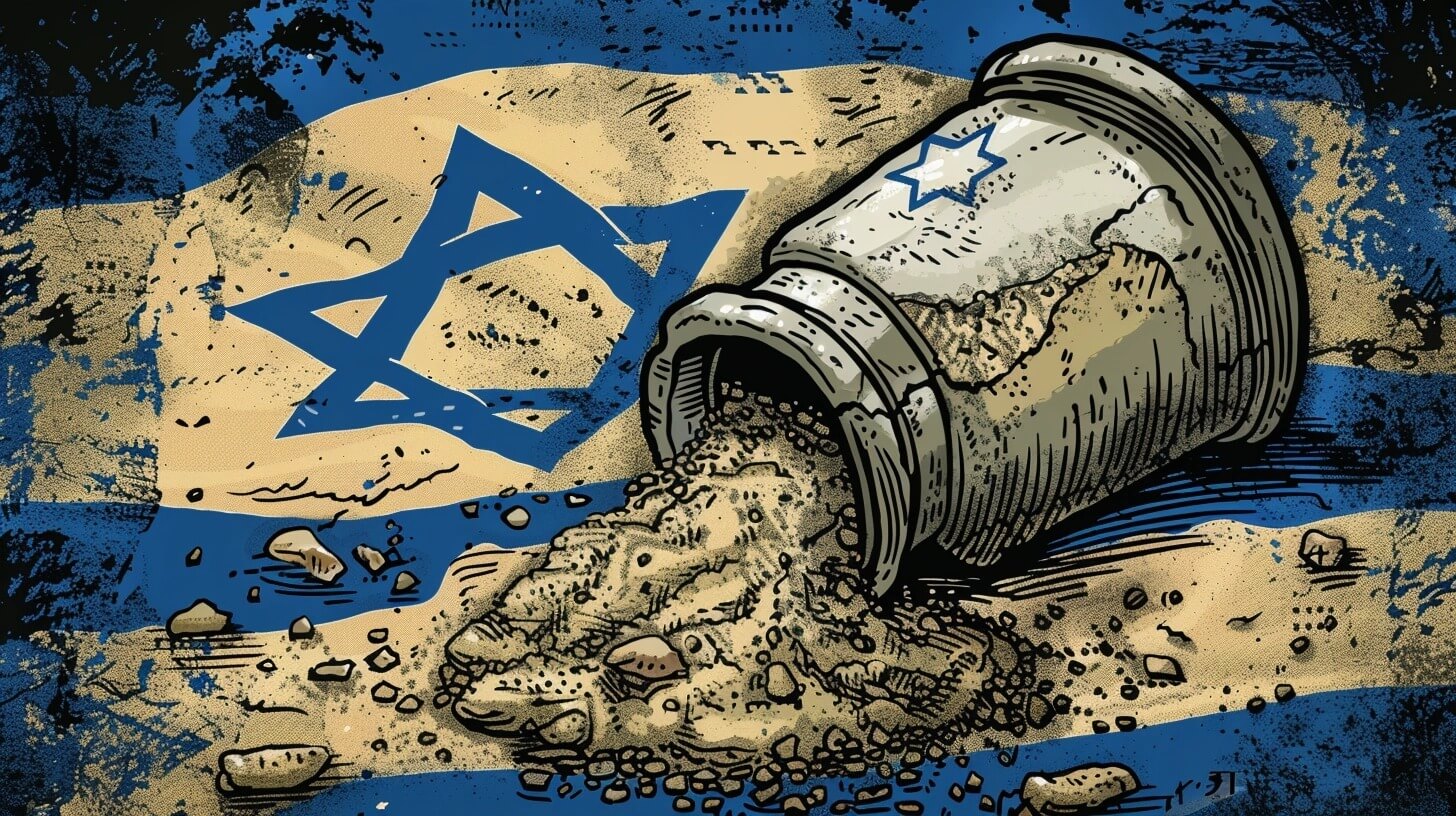BINTEL BRIEFDad wants mom’s ashes scattered in Israel. Should an adult child go to court to stop him?
Bintel turns to Moses and King Solomon for guidance. But beneath this feud lies real grief

A fight over disposition of cremated remains splits a family. Graphic by Benyamin Cohen/Midjourney
The Forward has been solving reader dilemmas since 1906 in A Bintel Brief, Yiddish for a bundle of letters. Send us your quandaries about Jewish life, love, family, friends or work via email, Twitter or this form.
Dear Bintel:
My mother passed away from a long and painful cancer struggle. She left my father with the sole decision on what to do with her remains. After her death, he announced he was cremating her remains and eventually scattering them in Israel. He told us he expects us to go with him.
Since then, my father, living alone, has become consumed by extreme nationalist and anti-Muslim disinformation. We have pleaded with him to wait until after the war ends. He refused and made many vile and false accusations about our commitment to Zionism.
I am sick of fighting my dad, but also think it’s hurtful that someone I trusted is behaving this way. Should I go to the scattering in Israel at a time when I don’t feel it’s safe or appropriate, should I seek a court order to prevent him from taking my mother’s remains out of the country, or is there a better compromise?
Signed,
Lost and Confused
Dear Lost:
Logistics first: Ditch the court order idea. Your mother left the decision to your father. You have no legal grounds. Going to court only furthers this rift.
You don’t have the moral high ground here, either. Your mother wanted your father to do whatever brought him the most comfort once she died. Respect her wishes. If Dad is utterly committed to this plan, respect his wishes, too. Or, as God put it simply to Moses: “Honor thy father and mother.”
Next, on the trip to Israel: Thousands of people have safely traveled between the U.S. and Israel since Oct. 7. Your father isn’t enlisting in the Israel Defense Forces or volunteering with World Central Kitchen. Your filial concern comes from a loving place, but if he can get himself to the airport, fly 12 hours, carry out his plan and pay for it all, he has the right to. Don’t go with him if you feel unsafe, and don’t make his reservations for him. You do you, and let him do him.
There’s more to say about the ashes, though, and for this let’s turn from Moses to King Solomon. That’s the ancient king who proposed splitting a baby in half when two people claimed parenthood.
Solomon’s proposal works better with ashes. Cremation typically yields several pounds of remains. A cousin of mine put some of her mom’s ashes in a locket heart and gave the necklace to an aunt as a remembrance. You can buy mini-urns, or keepsake urns, designed to share cremated remains with loved ones. So why not let Dad take what he needs to scatter in Israel and ask him, with all the tenderness and humility you can muster, if he’d give you a vial to keep here? Supply details on how you would display and treasure those remains as a way of honoring your mother.
Of course, King Solomon’s proposal was only a ruse to discern which of the two women was the baby’s real mother. She proved her devotion by ceding the infant to the other woman, thereby saving its life. That selfless act, in turn, allowed Solomon to see which woman should keep the baby.
You can undertake a similarly selfless act. If your father is unwilling to share the ashes, let them go in order to keep peace in the family and fulfill your mother’s final wish.
I fear this advice may come too late regarding the disposition of the ashes. But there’s more to say about the conflict over Dad’s views on Israel and Islam. Generational divides over politics and religion are hardly unusual. Families, campuses, communities and entire countries are divided over Israel right now. Don’t let this destroy your relationship. Draw your boundaries when he starts railing by saying something like, “I love you and I want to spend time with you, but I’m not going to talk about that.” Or redirect the conversation: “I wanted to tell you about plans for cousin Ariel’s bat mitzvah.”
So what if he questions your commitment to Israel? You know how you feel; you’ve got nothing to prove to him. Frankly, I’d be more concerned about his increasing self-isolation than his politics. Our parents don’t live forever, as you well know, and it won’t be easy to mend this relationship. But you must try, for both of your sakes. And you must do it with love, before it’s too late.
Finally, take a step back from the fight over ashes. Consider your own grief. Your pain has imbued your mother’s material remains with more power than they deserve. It’s the love she gave and the memories you have that matter. Those intangibles are yours forever — even if her physical remains are 6,000 miles away.
Find other ways to say goodbye. Take a walk in a place she loved, give tzedakah to a cause she championed, hold a memorial — no matter how much time has passed — and invite the family — including Dad — to bring a photo and tell a story. Seek professional counseling if you need it and give yourself the space to heal without directing that pain at your father. After all, he is hurting too.
Do you have an opinion about this Bintel, or a question of your own? We’d love to hear from you. Email [email protected].





















